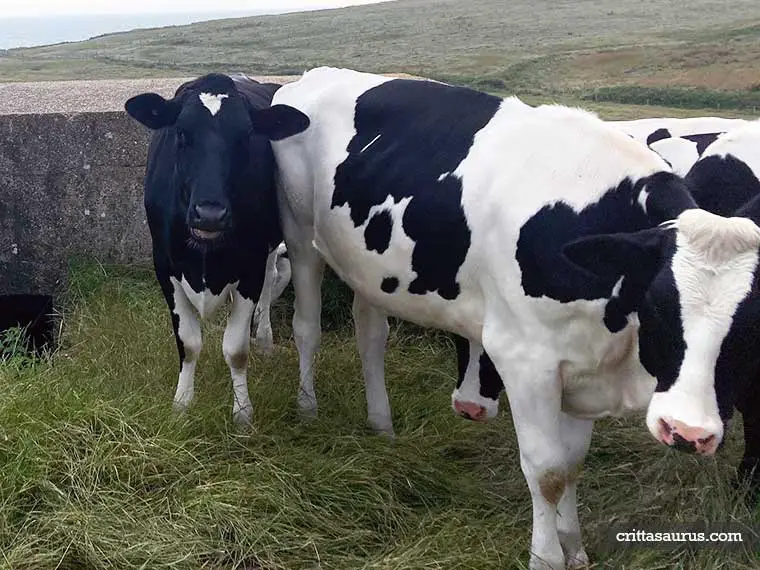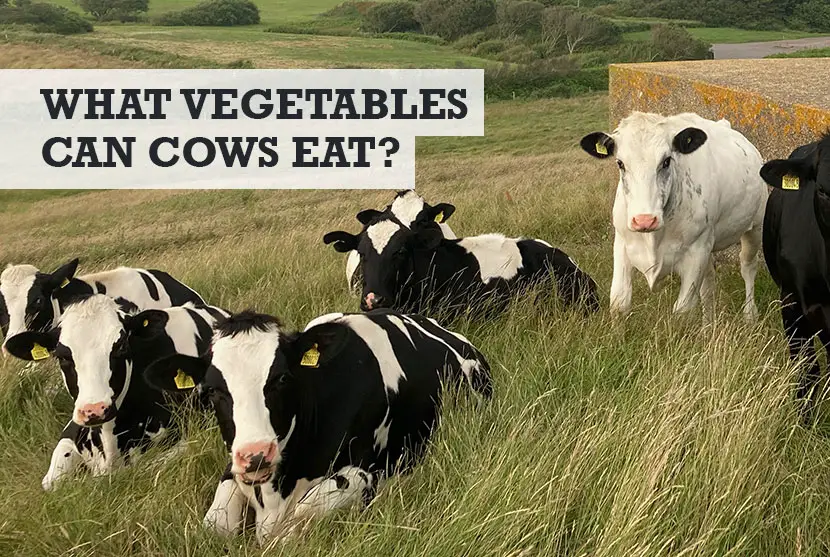Whilst we all know how cows will happily chew on grass all day, what’s not so clear or well-known is what vegetables are safe for cows to eat. If you’re wondering which veggie are a healthy treat for cows or can be fed without consequences, read on.
What vegetables can cows eat? Cows can eat ripe tomatoes, potatoes, cabbage leaves, empty pea pods, broccoli, and cauliflower. Whilst most veggies are fine, there are some that are toxic to cows which are listed further down the page.
The vegetables you and I enjoy can also make a delicious meal for cows. If cows could talk, I bet they’d appreciate it when you switch up their regular grass and hay diet with vegetables.
Stay with me as I discuss these vegetables one by one. I’ll share how each vegetable lives up to its nutritional promise. What do cows gain when they eat these vegetables? I’ll address all these in the article.
Nutritious vegetables that cows love to eat
Cows benefit from a well-balanced diet. Cows can all eat all vegetables as they make up part of this balanced diet. Instead of leaving excess produce to rot or dumping vegetable waste in open fields, why not give them to cows?
Cows also feed on cull vegetables. These are vegetables that the fresh market won’t accept because they are of low quality— for example, carrots that are too small and oddly shaped, overripe tomatoes, and so forth.
Vegetables used as cow feed have many vitamins and minerals, among other nutrients. But only use vegetables to supplement a cow’s daily diet. What I mean is, don’t replace a cow’s recommended diet with vegetables.
Before I go any further though, a few warnings.
What vegetables are toxic to cows?
- Unripe tomatoes are toxic to cows.
- Be careful not to give cows diseased potatoes or potatoes with green parts. Such potatoes are toxic to cows.
- Vegetables like eggplants, onions, capsicum, green tomatoes (unripe), bell peppers, and potatoes with a greenish color are toxic to cows. These vegetables are concentrated with a toxin known as solanine. Solanine gives the vegetables a bitter taste.When cows consume vegetables that contain solanine, they’ll have serious health complications. Cows even die of solanine poisoning. Avoid giving cows these vegetables.
Did You Know? Cows absolutely love licking salt and will go out of their way to get to salt blocks?
Vegetables that are safe for cows to eat
Let’s now jump right into each vegetable that is ok for cows to eat.
Carrots
Many of us love munching on carrots as a quick snack. Carrots are a favorite for cows, too.
Even Hindus in Leicester city, UK, know this. The Hindus hold celebrations to honor cows for the milk they produce. And what’s their way of saying thank you to these cows? They give the cows carrots as a treat.
Carrots are ready-to-consume vegetables for cows. Whether whole or chopped, cows find carrots quite edible.
Let cows eat carrots from the ground to prevent choking, as shown in this video. It’s best if you avoid hand-feeding cows with carrots. You can also set up a feeding trough that’s at ground level.
This way, there won’t be any height differences that can make a cow chock when eating the carrots.
The health benefits of carrots to cows are:
- Improved dental health: A cow’s dental health matters. Good dental health allows cows to feed well, meaning they’ll have a healthy weight and perform at their best. Chewing carrots helps cows to remove plaque stuck between their teeth.
- Better bowel movements: Carrots have good fiber content. Cows that eat carrots regularly won’t have a runny or hard stool. The fiber in carrots shapes a cow’s stool.
- For cows with loose stool, this fiber adds extra mass to the stool. For cows with hard stool, the fiber content in carrots moistens the stool. A cow’s bowel movement will be comfortable, thanks to carrots.
- Meeting their energy needs: Carrots are rich in Vitamin A, an excellent energy source for cows. These animals need energy for their bodies to perform essential functions.
- Improved eyesight: Carrots have vitamin A that gives cows good vision.
Handy Hint: Wild cows will have to forage for their own food in winter. Here’s what cows eat in winter months.
Tomatoes
Cows eat ripe tomatoes. Keep in mind that unripe tomatoes are toxic to cows. The green parts in half-ripe and unripe tomatoes can cause serious health effects in cows when eaten.
The pulp in ripe tomatoes makes these vegetables digestible for cows. When cows eat tomatoes, they’ll get these health benefits:
- Improved vitamin C levels: Tomatoes have a good amount of vitamin C. This vitamin enhances a cow’s skin health. Vitamin C will also boost a cow’s immunity, which means a cow will not fall ill frequently.
- Improved potassium levels: Tomatoes have high potassium content. Potassium will increase a cow’s milk production levels and improve general well-being.
Potatoes
Cows love eating potatoes. Be careful not to give cows diseased potatoes or potatoes with green parts. Such potatoes are toxic to cows.
Cows can also chock on potatoes. So, ensure to spread the potatoes on the ground or in a feeding trough at the ground level.
When cows eat potatoes, they’ll gain these health benefits:
- High energy levels: Potatoes are rich in starch, a source of energy for cows. When cows have high energy levels, they’re productive.
- Improved digestive health: The starch in potatoes is food to the good bacteria found in cows’ digestive tracts. These bacteria make digestion in cows better.
- Strong immunity: Potatoes have antioxidants nutrients. These antioxidants improve a cow’s immune response.
Cabbage leaves
Cabbage leaves are a perfect treat for cows. And cows are not picky when it comes to this vegetable. They eat white cabbage leaves, green cabbage leaves, and purple cabbage leaves, too. All cabbages are safe for cows to eat.

You don’t even have to chop up the cabbage for cows — they’ll do it on their own. A cow will finish a whole cabbage within a few minutes.
Cabbage leaves have vitamins like vitamin B6, Vitamin B2, and Vitamin K. They also provide fiber and antioxidants to cows.
When cows eat cabbages, they’ll enjoy these health benefits:
- Better digestive health
- Improved immune system
- Reduced cases of bloating
- Healthy skin coat (no visible skin lesions)
Empty pea pods
When you see cows eating empty pea pods, you’ll know that they find these vegetables delicious. These pods give cows more proteins, carbohydrates, iron, phosphorus, antioxidants, and fiber.
Keep in mind that pea pods have acidic content, too. It’s best if you give cows empty pea pods from time to time, not regularly. Also, don’t overfeed cows with pea pods.
Empty pea pods provide cows with the following health benefits:
- Good digestion
- Stronger bones
- Improved eyesight
- Good blood circulation
- Boosted immune system
Broccoli
Cows enjoy eating broccoli. It’s no surprise that they also eat broccoli stalks. This vegetable is in the same plant family as cabbage. It’s safe for cows.
Broccoli is good for cows as it has a generous amount of proteins, potassium, calcium, and vitamin C. When cows eat broccoli, they’ll get these health benefits:
- Healthy bones
- Improved metabolic functions
- Good physical development
Cauliflower
Cauliflower is also a cow’s favorite. Every part of cauliflower is safe for cows to eat. Cauliflower, like broccoli, is part of the cabbage family.
Cauliflower is good for cows because it has high fiber content, proteins, antioxidants, vitamins (vitamin K, C, and A), and minerals like potassium.
When cows eat cauliflower, they’ll get these health benefits:
- Strong digestive system
- Stronger immune responses
- Healthy blood flow
- Better overall health
Related questions
Can cows eat all vegetables?
No. Not all vegetables are good for cows. Some vegetables have harmful chemical content.
These chemicals can make cows experience health issues like hypersalivation, convulsions, and diarrhea. Be careful of the vegetables you choose to give your cows.
Do cows eat carrots or other veggies?
Yes. Cows love to eat carrots. If you’re looking to supplement your cow’s daily diet with vegetables, you can never go wrong with carrots.
Cows also eat other veggies. They’ll eat ripe tomatoes, potatoes, cabbage leaves, empty pea pods, broccoli, and cauliflower.
Can cows eat asparagus?
Yes. Cows eat asparagus. But don’t overfeed cows with asparagus. Only give balanced quantities of asparagus to cows. Why? Asparagus has low amounts of toxins.
If a cow consumes asparagus in high amounts, it may develop health problems.
Is broccoli good for cows?
Yes. Broccoli is a healthy and tasty vegetable for cows. It’s not harmful to cows.
Conclusion
Ever wondered what supermarkets and other big grocery stores do with their leftover vegetable produce? They feed them to cattle.
You can do the same providing you avoid those vegetables I listed which cows cannot eat.


